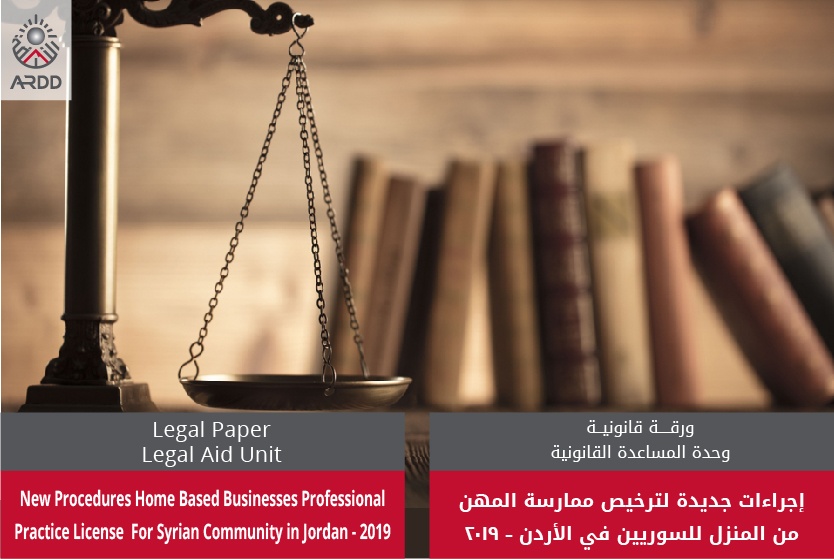Decisions and measures taken by the Jordanian Government to respond to the COVID-19 health crisis (24/3/2020-30/4/2020)
This paper is part of a series that summarises the decisions and measures taken by various sectors of the Jordanian government in the face of the COVID-19 health crisis. This is the second summary that compiles and documents the decisions and actions taken by Jordanian officials, this time in the 24/3/2020-30/4/2020 period, with the aim of […]
Legal Paper on children’s rights draft bill for 2020 in Jordan
The Convention on the Rights of the Child, one of the most important documents concerning children, was adopted in 1989, after the UN General Assembly approved making it into international law. It entered into force in 1990, having been ratified by most United Nations member states and is an international charter outlining children’s civil, political, […]
Legal Paper:New Procedures Home Based Businesses Professional Practice License For Syrians in Jordan

This paper addresses the recently amendments issued on the procedures of 2017 , which allows the practice of certain home-based professions, and their impact on Syrian women refugees’ economic participation and empowerment, the paper also discusses the summary of the development of these instructions, and how it affects Syrian refugees. It also clarifies the conditions of […]
Legal Paper: Non-Jordanian Work Permit’s Fee Regulation
In this paper we discuss the legal situation of migrant workers in Jordan, whose numbers has increased significantly in the last ten years, prompting the authorities to find legislative and regulatory solutions that seek to balance the situation of local and expatriate workers. The analysis below highlights the different stages the work permit Non-Jordanian Work Permit’s […]
Gendering decision-making in mobility and insecurity; the necessity for including Syrian women and girls in discussions on potential return
As part of its perspectives series, and after the paper “Jordanian youth and their decision-making processes regarding their futures”, in which Arab Renaissance for Democracy and Development (ARDD) addressed the phenomenon of increasing out-migration of Jordanian youth, and the second paper entitled “Regional Responses regarding the Integration of Europe’s Recently Arrived Arab Diaspora/Shataat” addressing the […]
Regional Responses regarding the Integration of Europe’s Recently Arrived Arab Diaspora/Shataat
In this paper we address the potential for civil society organizations (CSOs) from the MENA-region to positively contribute to discussions in Europe about the most recently arrived Arab diaspora, or shataat. We explore if, and how, lessons learned from this region with regard to hospitality and refugee hosting can be of use for governmental and […]
Jordanian youth and their decision-making processes regarding their futures
In this paper we address the issue of out-migration of Jordanian youth, which has consistently been noteworthy. We consider the factors that influence the decision-making processes of Jordanian youth regarding migration in a way that consciously takes individualistic motivations into consideration while attempting to recognize certain patterns and commonalities among this specific age cohort. Within […]
ARDD issues a legal paper on Birth registration statistics for Syrian Refugees in Jordan
Since the beginning of the Syrian crisis in 2011 and the influx of Syrian refugees into Jordan, it was expected that vital civil incidents would occur in the refugee community, especially with the protracted crisis situation since 2011, and the most prominent of these incidents were birth and death. Making documenting these incidents essential, especially in […]
Draft Court Fees Act Amendment of 2019
Draft Court Fees Act Amendment of 2019
Guidelines for Effective and Positive Parent and Teacher Communication
These Guidelines are the product of reflection on the issues that were presented in the field in Mafraq governorate in Jordan where a large population of Syrian refugees live alongside their Jordanian neighbors, many of whom come from lower socio-economic backgrounds. In this context it was observed that teachers and parents rarely talk and generally […]
